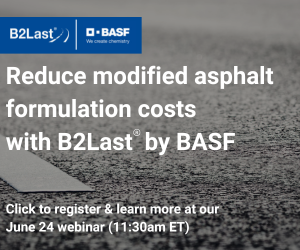
Much to the chagrin of family and friends, I am an inveterate rule-follower. I obey all road rules and signs. I never intentionally drive more than 2-3 miles per hour above the posted speed limit.
I take the same approach in my cooking endeavors, always carefully following the recipe to ensure a positive outcome.
Except one fateful time.
While in college, I tried to make my mother’s “Millionaire Pie” following her recipe. It was a refrigerated, no-bake pie. I thought it was easy enough for an unskilled, budding engineer, so I got all the ingredients together – except lemon juice. Figuring the pie wouldn’t miss the small amount of lemon juice, I decided to throw caution to the wind and make it without it. Twenty-four hours later the pie still had not set up in the refrigerator. It turns out that the lemon juice was the key to getting it to set. Who knew such a small thing could make such a difference? The answer was “lots of people, but not me.”
Making an asphalt mixture in the lab for future physical property testing depends on all the small things to get an optimal result. Follow these simple rules and you’ll maximize your chances of success (as well as making rule-followers like me happy):
1. Trust, but verify
The old nuclear disarmament adage holds for the aggregates that you are going to use in the mix. You don’t know how well the stockpiles were sampled before you received the aggregates, so don’t blindly trust that the gradation you received from the supplier will necessarily be representative of that sample. Run the sieve analysis.
2. Conquer separation anxiety
If you want to be able to properly proportion the mix to its desired gradation you’ve got to split the aggregates into multiple sizes. This is a crucial step, particularly if the samples were, shall we say, less than representative.
3. Warm-up thoroughly
To have a good workout that doesn’t end in pulled muscles you must warm-up thoroughly. To make a good mixture you’ve got to have everything heated properly. This includes mixing equipment (bowls, whips, paddles, scrapers, etc.) as well as materials. Aggregates need to be heated to an appropriate temperature depending on whether RAP or RAS is being used in the mix. If RAP or RAS is being used, they will need to be heated for a short time to remove any residual moisture. Asphalt binder should be heated to an appropriate mixing temperature, as determined by its viscosity.
4. Get hot
Speaking of asphalt binders…temperature matters. A lot. When tested at elevated temperatures used in asphalt mixture production, the viscosity of a typical unmodified asphalt binder will change by a factor of 3-4 over the span of 30°C (54°F).
Heating the asphalt binder to the proper mixing temperature will ensure that it will have the proper viscosity to coat the aggregates and produce a homogeneous mixture. Too hot, and you increase absorption (which could cause a “dry” mix or increase the design asphalt binder content) and possibly induce premature aging. Too cool and you decrease absorption (which could cause a “wet” mix or decrease the design asphalt binder content) and risk poor coating, resulting in a non-homogenous mix.
a.) Get hot, part 2 – Just as temperature matters for mixing, it matters also for conditioning and compaction in the lab. The conditioning temperature used, whether it is applied over two or four hours, can affect absorption in some mixes in the same manner described above. The result is that you can get a wetter or drier mix than you should have by doing nothing more than using an incorrect temperature for the selected asphalt binder.
As wisely noted by The Boss, “From small things, mama, big things one day come.” We tell our lab technicians to follow these simple rules for making an asphalt mixture and you can keep the small things from one day becoming big things affecting physical property testing of asphalt mixture specimens.
Mike Anderson is the Director of Research and Laboratory Services at the Asphalt Institute. Email him at manderson@asphaltinstitute.org.














